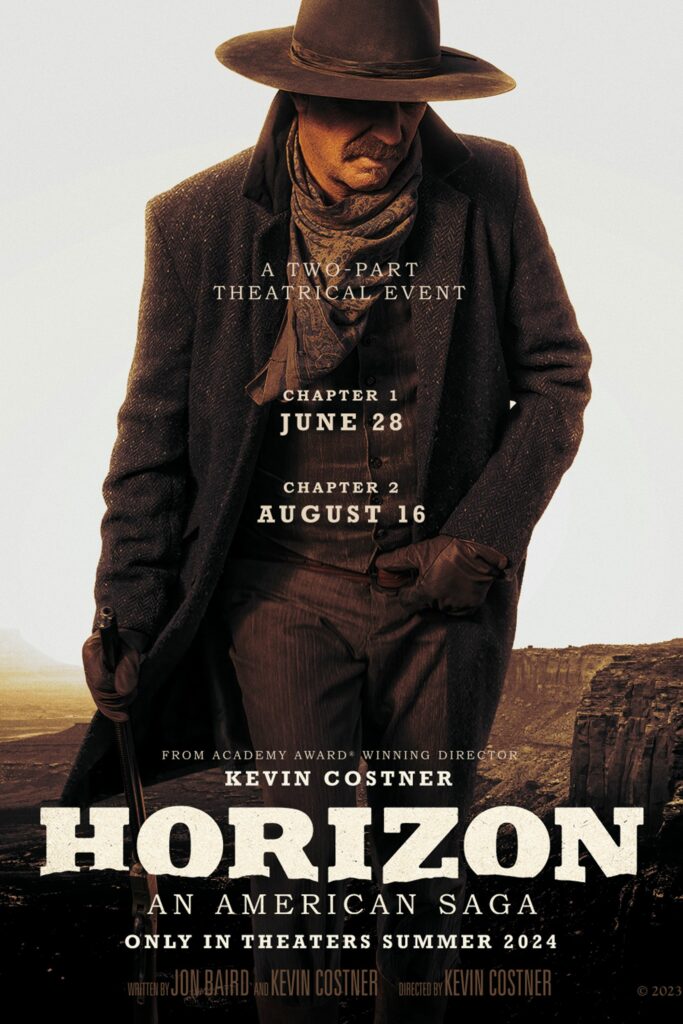
It’s hard to review a 4 chapter movie that’s only released its first part. But unlike the critics, I actually enjoyed this quite a bit, and in the audience I was with, there was a smattering of applause at the end. I checked rotten tomatoes and sure enough, the critics and public don’t agree.
There are many – and I mean many – problems with the movie. Characters aren’t introduced and as a result, for the first hour we don’t really know who these people are.
Horizon is the name of a town — or at least a potential town — on the bank of a river in the southwest — Arizona to be more specific.
This is Apache country, and because this settlement, which is being sold by someone named Pickering and sounds like a bit of a scammer, is being built exactly in the center of the Apache’s river crossing, it is under constant attack. The first happens when 2 men and a young boy attempt to survey the land and set up division lines. They are slaughtered and later found by a priest who buries them and leaves makeshift crosses on their graves. Apparently, some years later, a wagon train has arrived and set up mostly tents, plus one house on the opposite side of the river from the graves. They decided the grave-side of the river must have been the cause of the previous deaths, but we know that the first three were working on both sides of the river, and a bit later we learn why they were killed (they are driving away all the game).
The settlers have a dance and shortly afterward, the Apaches attack and burn the entire place down, including the wooden house. Mind, we still don’t know who these people are, including the First Peoples. (I prefer that Canadian term to “natives,” or “native Americans.” The word “native” always sounds insulting to me and I dare say, it will one day become an insult. Indigenous, which is the word one of the characters uses, is okay, and in my own family history I have come across documents which describe “negotiations with the indigenous people there.” (This was upstate New York.) But First Peoples doesn’t disparage second, third and fourth waves of immigrants. It just acknowledges that there was a group here who were first. Anyway, this long diatribe of words I like and don’t like has a lot to do with this movie, and its reception.
Simple minded people have written online stuff like, “Manifest Destiny, in 2024? You’re joking right?” “I don’t need to see the genocide of native peoples.” And so on. I think what Kevin Costner is trying to do — and the reason he called it a saga instead of a story — is not really bring back the magic of the western — but retell those stories in a way that is sympathetic to both sides of that war. It’s significant, in my opinion, that most of this movie takes place during the civil war, and there are a few nods to The Union. But this is like the story of the hidden war.
And then he did something quite extraordinary I thought. I was wondering how he was going to end Chapter 1 when we barely could remember the characters and knew almost nothing about them. But then as a team of scalp hunters rides off into the distance, suddenly there is this very long montage of scenes from the next movie. None of those scenes gave away the story, but with the music and a sort of whiff of the next movie, which comes out in a few weeks, it actually finished an open ended movie. Plenty of people were not satisfied with that ending, but I thought it was wonderful.
And the soundtrack is absolutely spectacular. It is beyond perfection. I’m a soundtrack fanatic and I had never heard anything by John Debney, and that’s probably because I would never go see the types of films he has scored. But with this I was constantly feeling the music.
Anyway, I loved it, except for the continuity which was very spotty, and the multiple story lines where I couldn’t tell, sometimes, where we were.
